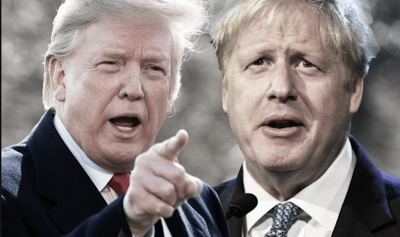The Geopolitical Implications of a No Deal Brexit

Brexit may seem like an inherently British affair, as the rest of the world has looked on with wry amusement and disbelief for the last three years at the continual wrangling over the issue, breathing a sigh of relief that such chaos is taking place in a country other than theirs; but we should be under no illusion that there will be significant geopolitical consequences for a United Kingdom which leaves the European Union without a deal.
Prime Minister Boris Johnson may have indicated recently during his meetings with European leaders that his preference is to secure a withdrawal agreement with the EU, but actions speak louder than words, and all other indicators suggest that the PM has long been intent on a No Deal Brexit. First Minister of Scotland, Nicola Sturgeon, was one of the first to comment on the fact that this was the case, as she met with Johnson in the first days of his premiership last month. Back then she made it absolutely clear that Johnson’s priority was not getting a deal with the EU:
“In reality he is really pursuing a no-deal Brexit because that is the logic of the hardline position that he has taken”.
Unlike his predecessor, Theresa May, Johnson has been a Brexiteer since before the 2016 referendum, and is a staunch believer in the benefits of leaving the European project. Explaining his position prior to the Brexit vote, he spoke of how Brexit was about taking back control of Britain’s democracy and how the Leave campaign had attracted liberal spirits such as himself who were effectively rebelling against an increasingly authoritarian organisation. He spoke of the ‘erosion of Britain’s democracy’. Ironically however, the very thing he was accusing others of doing before, is what his critics have been accusing him of doing in the last few days. For the announcement last week of the suspension of parliament till 14th October, for which the PM received the Queen’s permission, has been widely viewed as an attempt to prevent politicians from stopping a No Deal Brexit. Accused of staging a coup d’etat and being a ‘dictator’’, Johnson has been criticised of creating a constitutional crisis in the UK and sacrificing Britain’s democracy.
And who benefits from crashing out of the EU in such a way one may ask? Well none other than US President Donald Trump, with whom Johnson met just over a week ago. As Shadow Home Secretary Diane Abbott recently put it:
‘the key beneficiary of this project is Donald Trump and the interests he represents, and the project has his full backing.’
Indeed, Johnson had Trump’s blessing long before he became Prime Minister, with the US President openly supporting his candidacy. It seems the lucrative trade deal the two have spoken of has long been in the making and this explains why for Johnson, trying to engineer some kind of trade deal with the EU that is unlikely to be passed anyway by Parliament, is just unnecessary hassle.
However there are more factors at play here. If any deal was to be forged with the EU, it would involve the UK aligning itself to European regulations and tariffs to some degree. This would not carry favour with the US. Trump needs a No Deal Brexit to ensure that the US will be calling all the shots when it comes to a trade deal. Johnson knows this which is why the government is planning for that very scenario – hence the leaked documents of Operation Yellowhammer several weeks ago outlining the contingency plans in place for such a situation.
And yet one would be naive to think the ‘special relationship’ would stop at trade. By being largely dependent on a Trump deal would mean the UK would be even more under the US’ thumb when it came to, for example, foreign policy. It would be foolish to think that the UK could somehow afford, given such a state of affairs to pursue an entirely independent foreign policy. We have seen how Trump has dealt so far with China and Iran when they haven’t played ball. The UK would be forced to align itself geopolitically to the hawkish approach of John Bolton and Mike Pompeo. There could be no more sitting on the fence. We already saw with the UK’s seizure of the Iran-bound oil tanker in July that the nation is already supporting the US in its provocative policy towards Iran. And although it may now be trying to find a middle ground between US and EU policy at present, after Brexit, it would be foolish to think that Britain wouldn’t realign its foreign policy to suit its new trading partners. We only have to look at the effort put into maintaining its relations with Saudi Arabia, a country known for its human rights abuses, but a major buyer of UK weapons to realise that effectively, money talks.
Therefore if Johnson succeeds in engineering this No Deal Brexit, it will have serious repercussions not just for domestic life in the UK, but on the global balance of power, as a Trump-Johnson alliance could prove to be a definitive force to be reckoned with.
*
Note to readers: please click the share buttons above or below. Forward this article to your email lists. Crosspost on your blog site, internet forums. etc.
Featured image is from TruePublica

